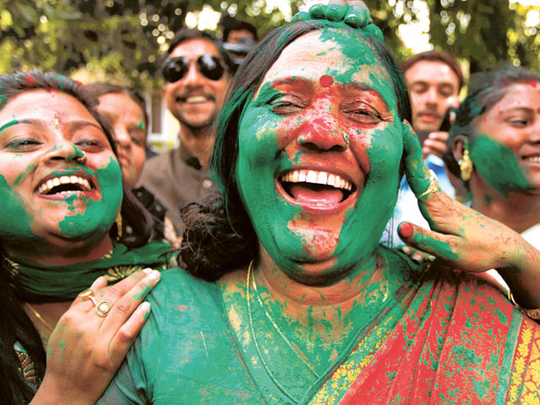
The results of legislative assembly elections in five Indian states this week have proved that there are no shortcuts to success in politics. And certainly not when the battle for power is fought in a backward and poorly-governed state where over 200 million restive souls are desperate for their pound of flesh in India's rapid economic progress.
The people of Uttar Pradesh expect the state to be run by a strong party that is capable of delivering good governance, providing healthcare, roads, electricity and jobs. And to realise this dream, they last month voted in huge numbers — 60 per cent of over 125 million registered electorates.
On Tuesday, they handed a decisive verdict: kicked out the corrupt government of flamboyant Dalit leader Mayawati and voted in 39-year-old Akhilesh Yadav, the new superstar of Indian politics.
Yadav's Samajwadi Party got a thumping majority in a hotly contested election that was widely expected to throw up a fractured verdict. In the process of booting out a corrupt chief minister, the electorate also gave a thumbs down to charismatic young politician Rahul Gandhi, whose Congress party finished a poor fourth.
The results are a major embarrassment for the Gandhis after Congress candidates were routed in the family's pocket boroughs of Amethi and Rae Bareli. The electorate, including millions of youth voting for the first time, has shown that it cannot be swayed by charisma alone. It wanted a party that has the capability to effectively govern and deliver.
Unlike the Congress, Yadav's Samajwadi Party has a strong organisational network and a huge cadre base in Uttar Pradesh. Yadav toiled for months and travelled over 9,000 kilometres, promising good and corruption-free governance.
Mass appeal
In his campaign rallies, the Australia-educated Yadav attracted crowds of youths, farmers and Muslims, who stand at the far end of the economic spectrum in this state.
And his party's well-oiled machinery ensured that the crowd of these restive admirers translated into votes on the polling days. In sharp contrast, Congress banked heavily on Gandhi alone. The party, which had an inadequate organisational presence on the ground, overestimated the power of his charisma and failed to expand its cadre base.
The people of Uttar Pradesh were craving for a change to escape Mayawati's misrule. But the Congress and its star campaigner Gandhi misjudged voter sentiment and failed to offer them a viable alternative.
While Yadav worked hard to revive his cadre and oil the party machinery, Gandhi's party relied solely on his good looks and charismatic style that hogged newspaper headlines and TV airwaves. Gandhi forgot that in Indian politics, the road to success is not via swanky newsrooms in Delhi, but snakes through the dusty lanes of the state.
The results are devastating for the Congress because it also lost in other states — Punjab and Goa — and just about managed to get an edge in Uttarakhand. This will have disastrous consequences for the party and Gandhi, who was expected to lead the party in the 2014 parliamentary elections.
After this defeat, Gandhi's ability to win elections is seriously in doubt. Also doubtful is his ability to govern as he has never held any government position. More worrying is the Congress' inability to cultivate a non-Gandhi who can lead the party. So for the time being it will continue to rely on Gandhi, his mother Sonia and sister Priyanka, hoping that the family will deliver in the next elections.
Constructive opposition
Congress and its ‘prince' may have bitten the dust. But a closer scrutiny of the results shows a silver lining. The party's tally and vote share have improved marginally in Uttar Pradesh.
In Punjab and Goa, it can play the role of a strong opposition. But the real test is in Uttar Pradesh where the Congress has to start afresh with a blank slate.
First, it has to get rid of its incompetent state leadership before beginning to build a base of party workers. During his election campaign, Gandhi promised that he is in the state for a long haul. Post-election, his actions will be closely watched. The biggest challenge for the Congress will be to choose someone who can lead the party in the next parliamentary elections scheduled in 2014.
Prime Minister Manmohan Singh's government will face increasing pressure in parliament in the coming weeks. The government has to handle some serious business, including the union budget. Also, a series of reforms, including the opening of the retail sector, must be initiated immediately to halt the Indian economy's downward slide.
Whether the Congress succeeds in pushing through this agenda will depend on realignment of political forces in view of the recent election results. Another immediate challenge the government faces is the presidential election in June. The Congress will need the support of Yadav's party to ensure that a candidate of its choice is elected.
Yadav's stunning victory and Gandhi's humiliating defeat took the focus away from another interesting development — the downslide of the main opposition Bharatiya Janata Party (BJP).
The right-wing BJP lost seats and vote share in Uttar Pradesh and Punjab. It is also expected to lose power in Uttarakhand where the Congress has a slight edge and is expected to form the government in the coming days.









